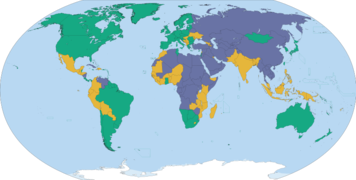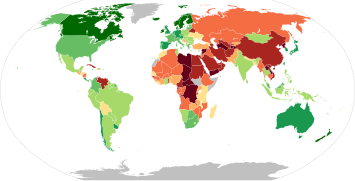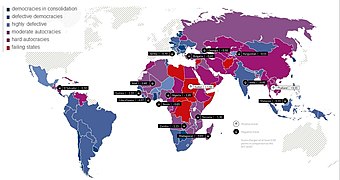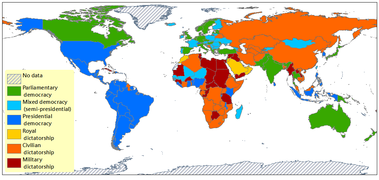
Democracy is a form of government in which the people have the authority to deliberate and decide legislation, or to choose governing officials to do so. Who is considered part of "the people" and how authority is shared among or delegated by the people has changed over time and at different rates in different countries. Features of democracy often include freedom of assembly, association, property rights, freedom of religion and speech, inclusiveness and equality, citizenship, consent of the governed, voting rights, freedom from unwarranted governmental deprivation of the right to life and liberty, and minority rights.

Freedom House is a non-profit organization group in Washington, D.C. It is best known for political advocacy surrounding issues of democracy, political freedom, and human rights. Freedom House was founded in October 1941, and Wendell Willkie and Eleanor Roosevelt served as its first honorary chairpersons. It describes itself as a "clear voice for democracy and freedom around the world". The organization was 66% funded by grants from the U.S. government in 2006, a number which has increased to 86% in 2016. It also receives funds from other governments and various semi-public and private foundations.
In politics, a regime is the form of government or the set of rules, cultural or social norms, etc. that regulate the operation of a government or institution and its interactions with society. The two broad categories of regimes that appear in most literature are democratic and autocratic. However, autocratic regimes can be broken down into a subset of many different types. The key similarity between all regimes are the presence of rulers, and either formal or informal institutions.
In political science, a political system means the type of political organization that can be recognized, observed or otherwise declared by a state.
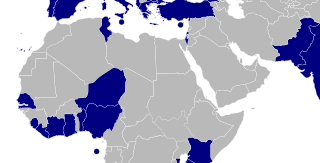
According to The Economist Group's Democracy Index 2020 study, Israel is the only democratic country in the Middle East, while Tunisia is the only democracy in North Africa. The level of democracy in nations throughout the world published by Freedom House, a U.S.-based, U.S. government-funded advocacy organization, and in various other freedom indices, report the Middle Eastern and North African countries with the highest scores are Israel, Tunisia, Turkey, Lebanon, Morocco, Jordan and Kuwait. Countries that have been consistently labelled as 'not free' by Freedom House (2017-2021) have been Iran, Iraq and Egypt. They have been increasingly becoming more and more adverse to the idea of liberal democracy with their scores steadily decreasing, only Iraq out of these countries have maintained some level of internet freedom with a score of 41/100. The remaining countries of the Middle East are categorised as authoritarian regimes, with the lowest scores held by Saudi Arabia and Yemen.

The Polity data series is a data series in political science research. Along with the Varieties of Democracy project and Freedom House, Polity is among prominent datasets that measure democracy and autocracy.

Freedom in the World is a yearly survey and report by the U.S.-based non-governmental organization Freedom House that measures the degree of civil liberties and political rights in every nation and significant related and disputed territories around the world.

The Democracy Index is an index compiled by the Economist Intelligence Unit (EIU), the research division of the Economist Group, a UK-based private company which publishes the weekly newspaper The Economist. Akin to a Human Development Index but centrally concerned with political institutions and freedoms, the index attempts to measure the state of democracy in 167 countries and territories, of which 166 are sovereign states and 164 are UN member states.

A democratic transition describes a phase in a countries political system, often created as a result of an incomplete change from an authoritarian regime to a democratic one. Scholarly analysis of the decorative nature of democratic institutions concludes that democratic backsliding (autocratization), a transition to authoritarianism is the most prevalent basis of modern hybrid regimes. The opposite process is known as democratisation, political changes moving in a democratic direction. Democratization waves have been linked to sudden shifts in the distribution of power among the great powers, which created openings and incentives to introduce sweeping domestic reforms.
Gerardo L. Munck is a political scientist specializing in comparative politics. He is professor of political science and international relations at the University of Southern California.
Authoritarianism is a political system characterized by the rejection of political plurality, the use of strong central power to preserve the political status quo, and reductions in the rule of law, separation of powers, and democratic voting. Political scientists have created many typologies describing variations of authoritarian forms of government. Authoritarian regimes may be either autocratic or oligarchic and may be based upon the rule of a party or the military. States that have a blurred boundary between democracy and authoritarianism have some times been characterized as "hybrid democracies", "hybrid regimes" or "competitive authoritarian" states.
Anocracy or semi-democracy is a form of government that is loosely defined as part democracy and part dictatorship, or as a "regime that mixes democratic with autocratic features." Another definition classifies anocracy as "a regime that permits some means of participation through opposition group behavior but that has incomplete development of mechanisms to redress grievances." The term "semi-democratic" is reserved for stable regimes that combine democratic and authoritarian elements. Scholars have also distinguished anocracies from autocracies and democracies in their capability to maintain authority, political dynamics, and policy agendas. Similarly, the regimes have democratic institutions that allow for nominal amounts of competition.
A hybrid regime is a mixed type of political system often created as a result of an incomplete transition from an authoritarian regime to a democratic one. Hybrid regimes are categorized as a combination of autocratic features with democratic ones and can simultaneously hold political repressions and regular elections. Hybrid regimes are commonly found in developing countries with abundant natural resources such as petro-states. Although these regimes experience civil unrest, they may be relatively stable and tenacious for decades at a time. There has been a rise in hybrid regimes since the end of the Cold War.

Democracy-Dictatorship (DD), index of democracy and dictatorship or simply the DD index or the DD datasets was the binary measure of democracy and dictatorship first proposed by Adam Przeworski et al. (2010), and further developed and maintained by Cheibub, Gandhi, and Vreeland (2009). Though the most recent data set is only updated for 2008, there is planning by Cheibub to update it to the present year.

Freedom in the World is a yearly survey and report by the U.S.-based non-governmental organization Freedom House that measures the degree of civil liberties and political rights in every nation and significant related and disputed territories around the world.
Democracy in Africa is measured by a variety of indexes primarily devised by Non-Governmental Organisations (NGOs), such as V-Dem Democracy indices, and Democracy index by The Economist.
The V-Dem Institute is an independent research institute founded by Professor Staffan I. Lindberg in 2014 that studies the qualities of government. The institute is funded by a number of government organizations, World Bank and several research institutions. The headquarters of the project is based at the department of political science, University of Gothenburg, Sweden.

The Bertelsmann Transformation Index (BTI) is a measure of the development status and governance of political and economic transformation processes in developing and transition countries around the world. The BTI has been published biennially by the Bertelsmann Stiftung since 2006, most recently in 2022 on 137 countries. The index measures and compares the quality of government action in a ranking list based on self-recorded data and analyzes successes and setbacks on the path to constitutional democracy and a market economy accompanied by sociopolitical support. For this purpose, the "Status Index" is calculated on the general level of development with regard to democratic and market-economy characteristics and the "Management Index" on the political management of decision-makers.
The V-Dem Democracy Indices is a dataset that describe qualities of different governments published by V-Dem Institute. This dataset is published on an annual basis and is publicly available and free. In particular, the V-Dem dataset is a popular dataset among political scientists used to describe the characteristics of political regimes around the world. In total, datasets released by the V-Dem Institute include information on hundreds of indicator variables describing all aspects of government, especially on the quality of democracy, inclusivity, and other economic indicators. An R package automatically bundles new data.
